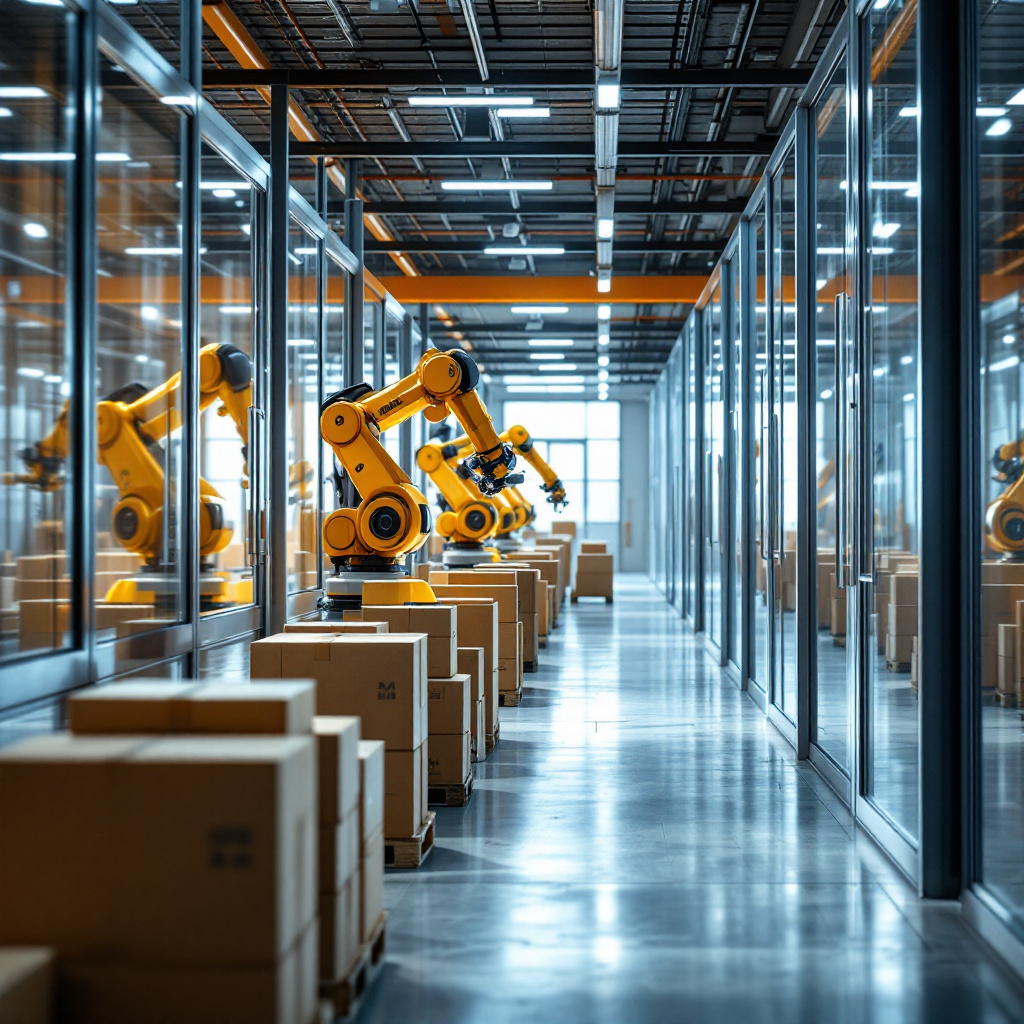AI Automation in Logistics: Driving Automation in Logistics Operations
The growth of AI in logistics has transformed the way companies manage complex supply chains, optimize transportation routes, and ensure timely delivery of goods. By integrating AI automation into day-to-day logistics operations, companies can not only improve operational efficiency but also reduce costs and enhance customer satisfaction. The global AI in logistics market is expected to reach $20.8 billion in 2025, propelled by a high adoption rate of AI technologies that offer predictive analytics, real-time insights, and better decision-making capabilities.
Automation in logistics allows stakeholders to streamline processes, reduce human error, and respond quickly to unforeseen challenges such as traffic disruptions or weather delays. Through AI-powered tools like predictive analytics, freight management becomes more precise, reducing idle time and the risk of missed delivery windows. Many logistics providers are also adopting AI algorithms to manage sensitive data responsibly, aligning with regulations like GDPR while improving service delivery.
Companies are using AI to automate data entry, monitor amounts of data from multiple data sources, and analyze data for route optimization. AI can automatically process accurate data to support informed decisions, helping organizations to identify and address inefficiencies. The use of AI also powers automation and human collaboration, enabling logistics companies to operate more flexibly.
According to DHL’s report on AI ethics, transparency in AI systems is critical when handling personal data, ensuring that all automated decisions can be audited and explained. AI can significantly improve compliance by integrating data protection measures into logistics software, which supports data privacy regulations and strengthens data handling practices across the logistics industry.

The adoption of AI in logistics is not only about improving delivery speeds but also about ensuring compliance with GDPR requirements. This approach ultimately helps to create a GDPR-compliant AI environment that enhances operational efficiency while maintaining trust between service providers and clients.
GDPR Compliance and Compliance Monitoring for Logistics Companies
GDPR compliance has become a priority for logistics companies that use AI to process personal data from EU citizens. The General Data Protection Regulation imposes strict data privacy regulations and requires robust data protection practices. Compliance monitoring ensures that all data processing activities adhere to these standards while minimizing compliance risks. As noted by industry experts, staying compliant is an ongoing effort that requires technological solutions and institutional dedication to privacy-first operations.
To achieve improved compliance, companies must implement management systems that continuously monitor data flows and ensure secure data storage. Regulatory requirements mandate that data inventory is up to date, with clear records on data access and usage. AI can help by automating complex compliance processes, reducing potential compliance issues, and ensuring compliance with GDPR regulations throughout the supply chain.
Many logistics companies rely on automated compliance tools to demonstrate compliance and meet GDPR requirements. For example, GDPR-compliant AI can be used to remove identifying information, anonymizing customer data while enabling analytics for operational optimization. The aim is to maintain strict data security standards while enabling operational efficiency.
AI-powered systems facilitate compliance efforts through automated audits and real-time monitoring. This ensures that data handling practices remain compliant with data privacy regulations even as systems adapt to new operational demands. Compliance with GDPR regulations builds customer trust and positions logistics companies for sustainable growth in the digital age.
For a deeper understanding of automation in GDPR compliance, you can explore logistics automation case studies which detail how organizations integrate AI to meet regulatory compliance while boosting operational resilience.
Drowning in emails?
Here’s your way out
Save hours every day as AI Agents label and draft emails directly in Outlook or Gmail, giving your team more time to focus on high-value work.
AI Agent and AI-Powered AI Solutions: The Application of AI in Logistics
The application of AI in logistics goes beyond route optimization and inventory tracking. AI agents support supply chain decision-making by providing real-time and accurate data insights. An AI agent can interpret vast amounts of data, streamline workflows, and assist in compliance efforts, ensuring that sensitive data is handled correctly. By integrating ethical AI practices, these solutions meet GDPR requirements while enabling effective business outcomes.
AI-powered systems enhance freight coordination, automate data handling processes, and improve overall logistics communication. They also help organizations to identify and address inefficiencies across different data processing tasks. The use of AI in this way ensures operations remain compliant while still achieving high performance levels.
Advanced AI technologies provide predictive analytics that help in anticipating delays, suggesting alternative shipping routes, and optimizing freight schedules. AI compliance mechanisms also validate data management approaches, checking against strict data policies. This ensures that companies remain compliant with data privacy regulations while benefiting from AI innovations.
For businesses looking to combine automation and human oversight, AI solutions offer a practical balance. They can automate workflow tasks without compromising on transparency or control, enabling logistics companies to remain agile. A resource on automating logistics workflows with AI agents offers detailed examples of how AI agents operate in real-world logistics scenarios.
Automate Workflow and Document Processing across the Supply Chain
Document processing is a time-consuming activity within logistics operations, with professionals spending 30-40% of their workday managing paperwork and associated tasks. AI can significantly enhance this process by automating data entry, validating accurate data, and enabling seamless integration between different systems. AI can help logistics companies automate data handling across multiple touchpoints in the supply chain, from purchase orders to delivery confirmations.
AI can automatically extract key data from invoices, shipping manifests, and compliance documents. By doing so, it reduces the risk of human error and ensures that compliance requirements are met more consistently. This automation is essential for organizations to identify and address workflow bottlenecks while adhering to regulations like GDPR.
AI-powered tools like document scanning solutions not only automate document processing but also enable real-time analytics for better decision-making. These tools are essential for maintaining regulatory compliance and protecting sensitive data. Within the AI process, anonymizing customer data before processing can eliminate potential compliance issues without impacting operational analytics.
Integrating AI into document management helps streamline supply chain recordkeeping while improving compliance processes. Organizations that adopt this approach strengthen their ability to demonstrate compliance during audits. For further reading, you can check how AI handles repetitive tasks in logistics through automated task management strategies that reduce workload and improve operational accuracy.
Drowning in emails?
Here’s your way out
Save hours every day as AI Agents label and draft emails directly in Outlook or Gmail, giving your team more time to focus on high-value work.
Logistics Communication and Data Management for Logistics Companies to Optimize Your Logistics
Logistics communication is a critical factor in ensuring on-time deliveries, accurate inventory tracking, and smooth supply chain operations. Advanced AI solutions support these communication channels by providing real-time data updates, automated alerts, and improved collaboration between stakeholders. Effective data management ensures that data flows are secure, monitored, and compliant with GDPR requirements.
Managing large amounts of data from various data sources requires reliable systems that can automate workflow processes without sacrificing compliance. AI-powered systems can continuously monitor data, checking for compliance risks and potential anomalies in data processing activities. This monitoring capability is essential for meeting GDPR requirements and upholding strict data privacy regulations.
AI in logistics can optimize your logistics by integrating predictive analytics to anticipate issues before they occur. For example, AI compliance strategies can align logistics software with data handling practices that are compliant within GDPR frameworks. This enhances operational transparency and builds customer trust in the logistics industry.

Data management practices supported by AI agents ensure that regulatory compliance is not overlooked during fast-paced operations. These systems not only meet compliance requirements but also improve service quality. Companies must integrate accurate data tracking into their communications strategy to ensure adherence to data privacy regulations while streamlining global operations.
GDPR-Compliant AI for Informed Decisions in the Logistics Industry
GDPR-compliant AI enables logistics providers to make informed decisions without risking violations of data privacy regulations. By applying ethical AI practices, companies ensure that personal data is processed transparently and lawfully. This approach also ensures that all decision-making processes can be audited when needed, fulfilling regulatory compliance obligations.
Within GDPR-compliant AI frameworks, companies use anonymizing customer data techniques to eliminate identifiers while still analyzing operational patterns. This allows for continuous improvement without breaching data privacy requirements. AI agents support compliance requirements by managing sensitive data and controlling data access according to GDPR mandates.
The integration of AI in logistics enables real-time analytics for freight optimization, thereby enhancing overall supply chain efficiency. By using AI-powered tools like advanced AI algorithms, companies can analyze data effectively, automate workflow operations, and align with strict data protection standards. This supports compliance efforts and ensures operations remain within GDPR rules.
Organizations must recognize that GDPR requirements do not hinder AI adoption but rather guide its responsible use. When AI compliance is embedded into operational workflows, companies can balance efficiency with accountability. For further information on tactical AI approaches, explore back-office AI strategies in logistics that focus on compliance-conscious automation. This ensures businesses maintain competitive advantages while safeguarding data privacy.
FAQ
What is GDPR-compliant AI in logistics?
GDPR-compliant AI in logistics refers to AI systems designed to meet the data privacy requirements under the General Data Protection Regulation. These systems prioritize secure data handling and allow for transparent decision-making in logistics operations.
Why is GDPR compliance important for logistics companies?
GDPR compliance is essential because logistics companies process personal data of EU citizens during their operations. Non-compliance can lead to substantial fines and loss of customer trust.
How can AI help in GDPR compliance?
AI can help in GDPR compliance by automating data protection measures, monitoring data processing activities, and implementing anonymization techniques to protect personal information.
What kind of data in logistics falls under GDPR?
Data such as customer names, addresses, contact details, and tracking information qualify as personal data and fall under GDPR regulations when handled by logistics providers.
What are AI agents in logistics?
AI agents in logistics are intelligent systems that assist in decision-making, process automation, and data analysis, helping logistics companies operate more efficiently and compliantly.
How does automation benefit logistics operations?
Automation reduces manual workloads, minimizes errors, and ensures faster processing of logistics tasks such as scheduling, routing, and documentation.
How can predictive analytics improve logistics?
Predictive analytics in logistics can forecast demand, anticipate delays, and optimize routes, leading to reduced costs and improved delivery times.
What role does data management play in GDPR compliance?
Data management ensures that personal data is stored, accessed, and processed in accordance with GDPR rules, reducing risks of breaches and non-compliance.
Are automated compliance tools necessary?
Automated compliance tools are beneficial as they help continuously monitor and audit data processing activities, ensuring ongoing alignment with GDPR requirements.
Can AI improve freight management in a GDPR-compliant manner?
Yes, AI can improve freight management by optimizing routes, tracking shipments, and adjusting schedules in real time, all while applying GDPR-compliant data handling practices.
Drowning in emails?
Here’s your way out
Save hours every day as AI Agents label and draft emails directly in Outlook or Gmail, giving your team more time to focus on high-value work.